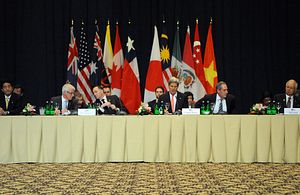This week, the 12 members of the Trans-Pacific Partnership agreed on a massive free trade deal spanning both sides of the Pacific Ocean. The deal ends five years of negotiations involving Australia, Brunei, Canada, Chile, Japan, Malaysia, Mexico, New Zealand, Peru, Singapore, the United States, and Vietnam to create a new “high-standard” trade agreement. But the deal notably excludes China, the second-largest economy in the world and the largest in the Asia-Pacific region.
When the TPP negotiations were first announced, the idea was met with widespread skepticism in China. The Obama administration’s new emphasis on the trade agreement coincided with the roll-out of its new “pivot to Asia” policy, later dubbed the “rebalance to Asia.” That stance had moderated somewhat in recent years, with Beijing adopting more of a wait-and-see attitude toward the trade deal, but there are still serious concerns that the TPP plays into a larger U.S. strategy of “containing China.”
Officially, however, China is staying fairly neutral on the TPP. In response to the newly announced deal, a spokesperson from China’s Commerce Ministry said that China “always keeps an open mind toward the construction of systems that are in accordance with World Trade Organization rules and are helpful for promoting economic integration in the Asia-Pacific region.” The spokesperson added that the TPP agreement is one of several important trade agreements in the Asia-Pacific region; China hopes the agreement will help push forward other plans for regional trade deals.
China likely is thinking of the Regional Comprehensive Economic Partnership (RCEP), a free trade agreement that would include all ten ASEAN member states as well as Australia, China, India, Japan, South Korea, and New Zealand. Because RCEP talks officially kicked off in November 2012, it’s been seen in some ways as China’s answer to RCEP – and Beijing would very much like to have RCEP concluded sooner rather than later.
Earlier this year, China’s foreign minister, Wang Yi, already expressed the hope that RCEP talks would wrap up in 2015; the conclusion of TPP makes that goal even more attractive for Beijing. The overlapping memberships – over half of the TPP members would also be in RCEP – would help mitigate any negative effects for China.
What about those negative effects? Predicting the economic impact of a free trade agreement is a complicated affair, but China stands to lose at least some economic growth from being on the outside of the TPP. A 2012 study by Peter A. Petri of the Peterson Institute for International Economics and Michael G. Plummer of Johns Hopkins University estimated that China would see about $47 billion (in 2007 dollars) in lost income from the TPP, leaving its economic growth roughly 0.3 percent lower than could be expected without TPP. Not exactly a deathblow for China, but not welcome news given the existing trend toward slower growth.
Xinhua provided its own primer on the TPP, including its potential economic effects on China. The piece admitted that in the short term, China’s economy would likely see “some level” of negative impact. But Xinhua argued that over the long term, no multilateral trade agreement could feasibly shut non-members of the international trading system without “greatly limiting” its own development.
That seems to be a nod to the argument that the TPP cannot credibly exclude China and still claim to be setting the rules of global trade. Japanese Prime Minister Shinzo Abe himself said this week that “it would have significant strategic meaning if China joined the [TPP] system in the future.”
Xinhua also said that China has already demonstrated a “deep-seated, high-standard, and comprehensive” pattern of opening to foreign trade, citing new free trade agreements with South Korea and Australia as well as the on-going RCEP negotiations and China’s “Belt and Road” project. And though China hasn’t entered into the TPP, Xinhua said, it is possible China will seek to join “at an appropriate time” in the future.

































